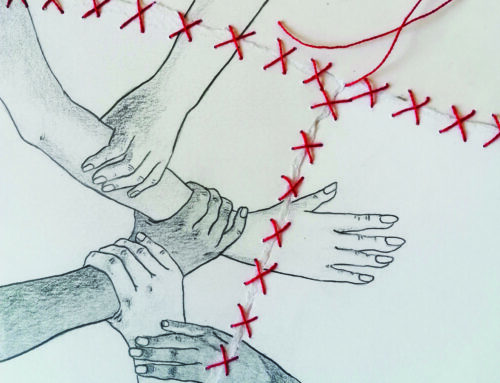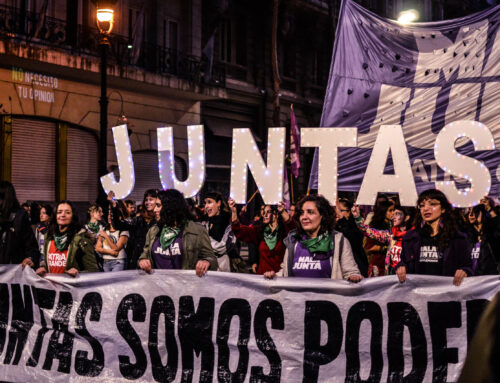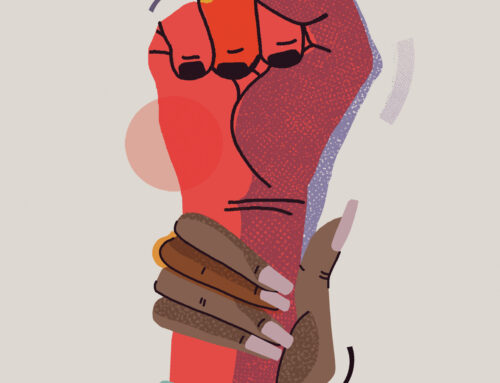
Fatima Ouassak, by Marie Rouge
by Marta Malo and Verónica Gago. Translated by Anouk Devillé
First published in Ojalá
The family is a concept that the far right has attempted to monopolize, and the idea of the “mother” is a central part of that dispute. We’re witnessing a coordinated offensive against politicized, feminist, and anti-racist maternities with deep social roots, among which the Mothers of the Plaza de Mayo in Argentina are a key reference point.
Fátima Ouassak’s book El poder de las madres: Por un nuevo sujeto revolucionario (The Power of Mothers: For a new revolutionary subject) gets to the heart of that battle. It pushes back on the monolithic figure of the mother, and calls on mothers—in plural and in resistance—to deploy their power as dragons to bring down authoritarian forces.
Ouassak is a political scientist, the daughter of immigrants, and a mother from a working class neighborhood. She is also a determined activist: she founded a local association in the banlieu of Bagnolet near Paris, a union of families called Front de méres [Mother’s Front], as well as Réseau Classe/Genre/Race, an intersectional feminist organization. She’s written two novels, Rue de Passage and Comme Ali, as well as two books of essays, El poder de las madres, which was recently translated to Spanish, and Pour une écologie pirate: Et nous serons libres.
The first time we met Ouassak she was speaking at the end of a demonstration. It was summer 2023, and French working class neighborhoods were once again rebelling against police brutality following the killing of 17-year-old Nahel Merzouk by a cop in Nanterre. We were impressed by her clarity, determination, and the fierceness of her words.
“My point of view is situated. As are all points of view, including those that claim they aren’t, and that they represent everyone,“ Ouassak writes in El poder de las madres. ”My point of view is situated, but I am addressing everyone.”
Moved by the desire to make her work known, but above all by the urgency of intensifying international conversations among feminists in these times of patriarchal restoration, and the desire to connect disparate points in a shared struggle that seeks to change the whole world, we contacted Ouassak.
We proposed to interview her and she quickly agreed. Our interview took place in December of last year in French via Zoom and then translated into Spanish (and now, to English). This is the first of two parts of our interview with Ouassak, which has been edited for clarity and length.
Marta Malo and Verónica Gago: The title of your book, El poder de las madres (The Power of Mothers), echoes ideas of women’s power and the subversion of community. What do you mean when you write about the power of mothers in the current context?
Fatima Ouassak: The French title references the power of mothers. It was a suggestion from my publisher, La Découverte. I wanted to talk about power and I wanted to emphasize the plural, referring not to “the power of the mother”, but rather, to “the power of mothers.”
First, I’m referring to power in the sense of political power. Right now, in the Western and especially European context, mothers, who appear as these tender, apparently small people, can transform the world should they wish to do so. When I began to say this in France, it was very uncommon. Mothers are called mamas, they are considered a small subject. They are of no interest to anyone, neither politically nor strategically, at least in the context of struggles.
What I want to talk about is the power we have.
Second, I speak of mothers in the plural because I am a materialist feminist that rejects the individual and individualizing dimension of neoliberalism. When I speak of power, I am referring to collective power, to a collective power that already exists in working-class neighborhoods in France.
The title is more descriptive than prescriptive. It recognizes there are mothers who are already in struggle, rather than saying “mothers need to struggle.” Four or five years before writing the book, I co-founded the Front de mères in France. And it’s not just Front de mères, there’s other organizations too.
In 1984, there was a movement called Les folles de la place Vendôme [The madwomen of Place Vendôme] in France, and they did just what I describe in the book. I want to reaffirm the historic struggles that were waged by mothers that once existed as a strategic potential.
MM and VG: As feminists, we understand the notion of the “mother” is fraught with ambivalence, caught between oppression and power, and dimensions that are reactionary and subversive. Could you elaborate a little more on the motherhoods about which you speak—motherhoods in plural—that are also subversive?
FO: In 2012 there was a huge demonstration under the banner of Manif pour tous [demonstration for all, led by the French ultraconservative movement that’s focused on campaigns against queer marriage and childrearing, and emotional and sexual education in schools].
At that time the Front de mères didn’t exist. I remember seeing families walk by, which in reality were overwhelmingly fathers, and I said to my compañeros: ‘We must watch out, this is a dire threat to us.’
Of course, there were some Muslim fathers and racialized Muslim mothers who were part of the demonstrations and they were there for reactionary reasons. It was, in essence, a reactionary political organization demonstrating in a manner that was directed against us and our children.
This is something we had to and still have to fight against, including within our own ranks and our own communities. That demonstration was an important factor in the creation of the Front de mères. Today, in France, the most dynamic movement of parents is called Parents Vigilants [Parents on guard]. It’s a large movement that brings together thousands of people who are racist, Islamophobic, LGBT-phobic, homophobic, transphobic and so on. It has a very combative presence in schools.
As feminist and anti-racist mothers we are facing this movement, which is a war machine founded and supported by Éric Zemmour [one of the most visible figures on the French far-right].
The other struggle we’re engaged in as feminist and anti-racist mothers, which I also examine in the book, is the way in which institutions and the state treat fathers and mothers. In my opinion, the unequal treatment that exists in relation to families depends on whether or not they’re critical of the established order.
A mother or a father who supports an institution, who does not criticize it, is going to feel encouraged and supported. This also applies to Muslims, racialized people and people from working-class neighborhoods.
Mothers like myself who question institutions, who are critical of school, of police, of the way working-class neighborhoods are run, are demonized. It’s not just a question of skin color or social class, it’s also a question of whether or not you have a critical perspective and question institutions.
In El poder de las madres I draw on my experience as an activist to suggest that a mother who becomes involved politically in order to protect children, not only her own, but children in general, will be labeled an Islamist, a communitarian, and treated like the devil. It is important to point out this blind spot common among our feminist comrades, which is how racialized women are treated when they become involved in politics.
MM and VG: In The Power of Mothers, school appears as a space for involvement and as a site of political battles. Tell us a little more about that.
Fátima Ouassak: In France, there are people who are very committed to feminism, to the left and even to the radical left, but who, when they have children, develop a discourse opposed to the idea of sacrifice.
These are people committed to social change, sometimes even to the idea of revolutionary transformation, but when it comes to choosing their children’s school, if they live in Bagnolet, for example, they don’t enroll their children in Bagnolet, but in Paris. The justification is that they don’t want to “sacrifice their children.” To be clear, there are a lot of Black, Arab and Roma kids at that school, and they don’t want their children to share their lives and upbringing with our children.
This is one of the reasons feminists don’t talk much about their role as mothers. If they did, I think they would be forced to politicize their decisions, or at least to explain them. Do I send my children to play soccer with the other kids in the neighborhood, or do I sign them up for capoeira or skiing?
By asking these questions we position ourselves from the material conditions within which we exist, which is central to materialist feminism.
On a general level, I can say I’m in favor of revolution. But when it comes to questions like where will you send your child to school, there is no longer any abstraction. The contradiction becomes clear: yes, I want to change the world, but not at home. In the end, through my choices, I promote the reproduction of established inequalities and social injustices.
This debate has yet to really take place in France, because it is a debate that’s painful, and it’s one we must be able to engage in. It’s not something that is the sole responsibility of feminists, but it demonstrates the difference between political rhetoric and individual strategies.
The aim of my questioning is not to make feminists feel guilty, but rather to raise the matter of collective strategies versus individual strategies. In France, when we talk about mothers, we tend to talk about them as individuals and discuss the relationship a mother has with her child.
That, for me, is a strategic impasse. As an individual the mother seeks the happiness of her child, not that of all children, because we live in a society that promotes competition between children and between parents, and the idea that for my child to succeed, yours must fail. That is what we must break, we need to understand that it’s exactly the opposite: for my child to succeed, your children must also succeed. This shift is difficult, even within the Front de mères, because it goes against everything we are told and encouraged to do.
MM and VG: Could you tell us a little more about the idea of the revolutionary subject that you develop in The Power of Mothers?
FO: Before I started writing The Power of Mothers I had the idea of a trilogy in my head. I had too much material, so I thought about writing three books: the first would be the subject, the second the verb and the last the complement. That’s why the subtitle of The Power of Mothers is “for a revolutionary subject”.
Based on my political experience, the subject had to be women, because I struggle in community with women. In the book, I explain how, at a certain point, there was an issue with the cafeteria at my daughter’s school, and I called a meeting of the families involved. I didn’t call out for ‘concerned women’ to attend, but rather ‘concerned families.’ Not a single man showed up.
The specific reality in which I carry out my organizing, which is where my political commitment lies, is within a community of women. For me it is important to say that it is a community. Of course it isn’t free from relationships of domination, nor is it free from violence at times, but it is the community in which I feel most at home, from which I am able to become involved politically, in which I can mature, and within which I manage to think things through. Among women, and specifically mothers, we can not [only] think about the violence and oppression mothers face, but also about the power mothers have as protectors of childhood.
When I say mothers I include not only those with biological children, but also women who take care of kids in their daily lives, whether they are their students, their nieces and nephews, the children of their neighbors, or others from their community. It is a reference to intergenerational care, which is to say, to women who want the best for the next generations.
MM and VG: Given your interest in transnational activism, what do you think are the most important aspects of internationalism in the present context of war?
FO: I think there are two important aspects. When I talk about internationalism, I am referring first of all to Europe, which is a scale that is too often neglected because we associate Europe with neoliberalism, and we don’t care to think beyond that. That’s a big tactical mistake.
I think the opposite is true, that we ought to put effort into relations within Europe. What can we do between European countries? Recovering our strength within Europe would also allow us to broaden our internationalist perspective.
The second aspect is primarily with regard to Europe’s relationship with Africa. This type of internationalism is challenging, especially for people like me who come from Africa. It is very difficult to work with our countries of origin. I am Moroccan and I know there is an issue that I should not address in Morocco: that of Western Sahara [which is occupied by the Moroccan government].
The colonial question and the issue of Palestine are also difficult to talk about within our home countries. But because it is difficult doesn’t mean that it shouldn’t be done, and the diasporas are a starting point.
If we don’t work with countries linked to Europe’s colonial past, that is, with Morocco, Senegal, Mali, and Tunisia, there can be no internationalism. Internationalists in France love to link up with countries like Argentina, Bolivia, Chile… And they love it because it costs it nothing, nor does it require questioning anything.
But working with Algeria or with the Congo is a huge challenge. No one wants to organize things in these countries, with activists there. We know there are activists like us there; but we don’t even know who they are.







